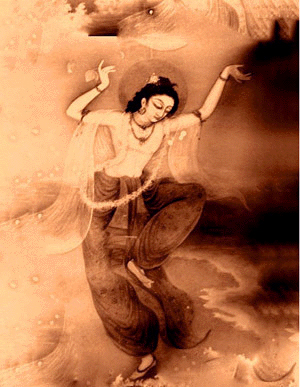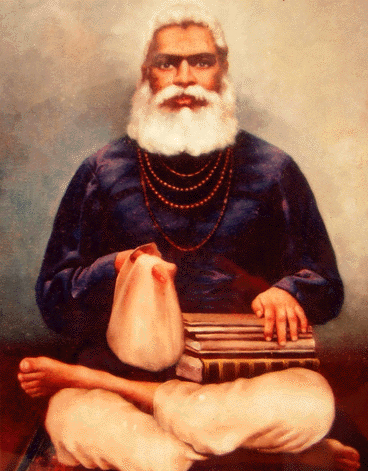Sri Sanmodana Bhasyam, Part 15
BY: SUN STAFF
Jun 10, 2016 — CANADA (SUN) — A commentary on Lord Caitanya’s ‘Siksastakam’ by HDG Srila Bhaktivinoda Thakur, with a Bengali song for each verse that expands upon Mahaprabhu’s devotional moods (Sanskrit, 1886).
yugayitam – appearing like a great millennium; nimesena – by a moment; caksusa – from the eyes; pravrsayitam – tears falling like torrents of rain; sunyayitam – appearing void; jagat – the world; sarvam – all; govinda – from Lord Govinda, Krishna; virahena me – by My separation.
“My Lord Govinda, because of separation from You, I consider even a moment a great millennium. Tears flow from My eyes like torrents of rain, and I see the entire world as void.”
When bhava or ratibhakti reaches the stage of sthayibhava (constancy), it mixes with four other bhavas – vibhava, anubhava, sattvika and vyabhicari and transforms into bhakti-rasa or the spiritual mellow of devotional service. Then the ecstatic symptoms of anubhava and sattvikavikara are fully expressed.
Srila Rupa Goswami, describing prema, writes in the Bhakti-rasamrita-sindhu, “That bhava-bhakti which from the start so excessively affects the heart that it melts into a sublime salve of love, which brings within easy reach the highest sentiments of divine bliss, which generates an intense desire for Krsna, is known by the perfected devotees as prema.” From this statement it is obvious that an extreme attraction, affection and spontaneous dedication to Lord Krsna is synonymous with prema.
The relationship between the visaya (the object of worship, or Krsna) and the asraya (the devotee) is exchanged through the five principal rasas of neutrality, servitorship, friendship, parenthood and conjugal love. Sometimes the main rasas in the relationship subside, allowing the seven secondary rasas of laughter, wonderment, pity, bravado, anger, fear and horror to be relished.
Among the principal rasas, conjugal or madhuryarasa is the most exalted. As madhuryarasa increases in intensity, it manifests all the excellences of prema, which are pranaya (love that avoids respect), sneha (melting of the heart), mana (hiding of love by crooked means), raga (attachment), anuraga (further attachment), bhava (ecstacy) and maha-bhava (great ecstacy), one after another.
In santarasa (neutrality), there is a kind of affection for the Lord marked by great exultation. Such affection is displayed as an attachment for Brahman coupled with an attitude of disregard and unconcern for everything else, including other rasas. When this affection (known as mamata) increases, the attraction deepens to the point of dasyarasa or servitorship. In this rasa, the intensified affection remains permanent even if the relationship is seriously tested.
When the affection for the Supreme Lord is fortified with unflinching faith and trust it is called pranaya, the very essence of sakhyarasa or friendship. But in the presence of awe and reverential worship pranaya will not appear.
As affection increases, pranaya develops into a mischievous and crooked mood of unusual flavor known as mana. In this mood, the loving resentment of the devotee forces even the Supreme Lord to compromise, out of His desire to relish this emotional exchange.
That abundance of love that melts the heart to emotional liquid is known as sneha. Sneha is symptomatized by profuse unchecked tears; and in this stage the devotee’s yearning to see Krsna never admits satiety. In vatsalyarasa or parental love this yearning is felt as the devotee’s constant anxiety for Krsna’s wellbeing.
Sneha infected by intense craving is called raga. In the stage of raga a moment’s separation from the beloved is unbearable; while in union the opposite is true even extreme grief feels like exhilaration. In raga, the object of worship (Krsna) is made to appreciate His own ever youthful form by the attentions of the devotee; thus raga itself becomes ever new and ageless and is transformed into anuraga.
In anuraga the lover and beloved enrapture one another into obedience. There is even a longing to be born as animals or other lower species that enjoy a direct connection with Krsna; this is called premavaicitra, the variations of love. In the anuraga stage, separation from Krsna blesses the devotee with excessive ecstacies.
#Sri Sanmodana Bhasyam





Leave a Reply